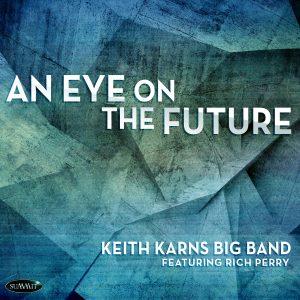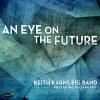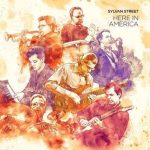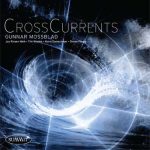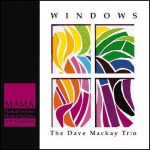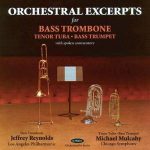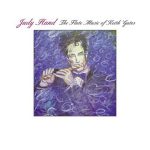An Eye on the Future – Keith Karns Big Band featuring Rich Perry
“We are concerned with the future through the past.” Mel Lewis used those words to summarize his vision for the Mel Lewis Jazz Orchestra (previously the Thad Jones/Mel Lewis Orchestra, now the Vanguard Jazz Orchestra), and their 1983 record Make Me Smile & Other New Works by Bob Brookmeyer. The title of our record An Eye on the Future alludes to Lewis’s quote. This sentiment summarizes the mission statement of our band and the music contained here: we celebrate creativity and innovation while also remembering our roots in the jazz tradition.
One of the ways we are able to maintain our roots in jazz is by standing on the shoulders of some of the great jazz arrangers of all time. Fletcher Henderson, Duke Ellington, Thad Jones, Bob Brookmeyer, and Jim McNeely have all had a profound influence on this music. We hope that this tradition can be heard alongside our own voice.
This project also celebrates the voice of one of today’s most important saxophonists, Rich Perry. Rich is perhaps best known for his work in the Maria Schneider Jazz Orchestra, but he has also been a longstanding member of the Vanguard Jazz Orchestra, and is one of the most prolific soloists in the last three decades. In my opinion, Rich Perry is one of the most expressive saxophone soloists of our time. In writing for Rich, I wanted to showcase his distinctive voice while also giving him and the band the opportunity to interact in new and interesting ways. The result was five saxophone concertos, each showcasing a different aspect of both Rich’s playing and the band. The last two tracks feature the band exclusively.
—–
“Two or Three Birds With One Bird” – I am fascinated by “happy melodies.” Happy melodies are often considered to be naïve or un-hip. One of my favorite arranging techniques is to take a melody we would normally consider as un-hip and set it in a way that challenges those expectations. This is the case here. In this instanced I used a dense chromatic harmony and through-composed form to set the melody. The through-composed structure helps to facilitate interaction between Rich and the band.
“An Eye on the Future” – I wrote this lullaby for my son the day I found out that my wife and I were going to be having a baby. Rich’s beautiful sound perfectly captures the hopes and fears any new parent has.
“The Thursday Club” – I have always been a fan of Art Blakey and the Jazz Messengers. This is our homage to the great Jazz Messengers tunes like Moanin’, One By One, and Dat Dere.
“Like Someone In Love” – When you consider the lyrics, we assume this to be a happy song. Love is not always a happy emotion; it is complex and ever-changing. Here we tap into the more complex aspects of love. This can be heard in my reharminazation of the melody and Rich’s understated yet sophisticated melodic interpretation.
“The Law of Contagion” – Unlike the previous four tunes, this piece integrates Rich with the band. The first theme is based on the half/whole diminished scale, and alludes to Bartok’s Music for Strings, Percussion, and Celesta. The form follows a theme and variation approach, but is broken up by solo statements, collective improvisation, shout choruses, episodes of boogaloo, and most notably, a four voice fugue.
“Without a Song” – This arrangement is about the ideals of freedom, love, and justice. The original lyrics to this song featured the racist line “A darkie’s born, but he’s no good no how, without a song.” This line was changed by Billie Eckstein in his famous 1946 version where “A darkie’s born” was changed to “A man is born.” This transformed the meaning of the song to signify concepts of racial justice and freedom. The new meaning was carried on in interpretations by many black artists including John Coltrane and Joe Henderson. My arrangement uses this meaning as a way of commenting on modern social, political, economic, and racial injustice. Today when we face so much division in our country, these issues are more urgent than ever. This can be heard in the deconstruction of the melody of “Without a Song,” and how I set it using textures borrowed from Stravinsky’s Petrouchka. The arrangement ends on a message of hope tinged with sadness and uncertainty.
“Crowd Control” – Last year a colleague bet me that I could not write in a modern big band style while conforming to the constraints of composers from the 1920s (Due to the limits of 1920s recording technology, arrangers had to be pretty sophisticated in their approach to form in order to incorporate complete melodic statements and multiple solo statements in under four minutes). This piece is based on Don Redman’s 1926 composition “The Stampede.” The form is almost exactly the same as “The Stampede” (I added a two measure piano intro to the melody, and an eight measure coda), but the style and texture are decidedly modern. Rather than break up solo statements between three soloists as was done in the Redman arrangement, I solo throughout.
by Donald Elfman for the New York City Jazz Record
The Keith Karns Big Band is a fine example of the way talented composers and arrangers breathe new life into an age-old format. Karns, a talented trumpeter and flugelhornist, admits to “standing on the shoulders” of some of the greats—Fletcher Henderson, Duke Ellington, Thad Jones, Bob Brookmeyer, Jim McNeely— but those shoulders provide a solid base from which to look outward and forward.
The two standards here begin the discussion. “Like Someone in Love” becomes a haunting and intricate exploration of love. The melody has been darkly reharmonized and tenor saxophonist Rich Perry quietly but engagingly tells the story. The band builds to a gentle swing, but the sophistication remains. The arrangement of “Without a Song” is another bold stroke, as it is Karns’ individual comment on freedom and, alas, injustice. Karns on flugelhorn takes the four bars that start the melody and repeats them as other players comment and deconstruct it in textures borrowed from Stravinsky’s “Petrouchka”. The song has been interpreted in a political fashion before—Billy Eckstine, John Coltrane—but the gravitas and power here are extraordinary.
Karns’ originals are something else again. The title tune is a lullaby written for the anticipated birth of a son and, in Perry’s playing and the writing for band, addresses the hopes and anxiety therein. “The Thursday Club” is an homage to the funky Bobby Timmons-like groove of Art Blakey and his Jazz Messengers and Perry truly gets to wail. On “The Laws of Contagion”, Perry finds himself in the midst of the band and the tune includes solos from him as well as trumpeter David Matthews, trombonist Connor Eisenmenger and drummer Connor Kent. Look out also for shout chorus, collective improvisation and even a fugue and a boogaloo!
And, finally, “Crowd Control” is based on a 1926 Don Redman tune but given modern voicings. Karns is the soloist and mixes the joy of the past with the adventure of the new. That sharp and appealing blend is what makes this production (by Karns) and these performances so distinctive.



